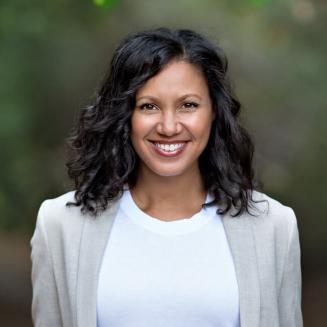OUR PEOPLE

Marilyn Thomas, PhD, MPH
Assistant Professor
UCSF Weill Institute for Neurosciences
UCSF Weill Institute for Neurosciences
School of Medicine
2320 Sutter Street, #0
San Francisco, CA 94115
Image

Education and Training
San Francisco State University,San Francisco, CA, BS - 5/2010 Microbiology, Cum Laude
San Francisco State University,San Francisco, CA, MPH - 1/2014 Public Health
University of California Berkeley,Berkeley, CA, PhD - 5/2019 Epidemiology
Awards and Honors
John A. Watson Faculty Award, UCSF School of Medicine Dean's Diversity Fund, 2024-2027
Research Resiliency Initiative Mini-Grant, The Office of the Associate Vice Chancellor for Research Opportunity and Impact, 2025-2026
Irene Perstein Faculty Award, School of Medicine Mount Zion Health Fund, 2025-2028
Overview
Research Interests:
- Structural and Social Determinants of Health
- Chronic Disease Risk, Accelerated Aging, Cognitive Decline, Mental Illness, and Mortality
- Social Policy, Educational Attainment, and Causal Inference
Dr. Thomas is a social epidemiologist investigating the mechanisms by which structural factors contribute to differences in health outcomes. Her research evaluates policy effects and emphasizes methods for causal inference in the absence of randomization. She specializes in developing adequate measurement and statistical methods in public health research.
Dr. Thomas’s research centers on Black experiences, primarily in three life domains: policing, negative sentiment or discrimination, and higher education. Her innovative approaches have demonstrated subpopulation patterns in risk of being killed by police, and in law enforcement characteristics related to police killings, as well as how experiences of area-level bias, interpersonal discrimination, and culturally-specific coping strategies influence health, providing evidence that institutional factors contribute to physiologic stress-regulation and accelerated aging, and that improved socioeconomic position, particularly educational attainment, and cultural identity may buffer many biological consequences.
Her current research examines structural factors in higher education, either as public policy or through individual-level educational attainment, as a potential causal driver of differences in poor health. Though structural exposures are implicated as fundamental causes of higher education gaps across subpopulations, little to nothing is known about if, and to what extent, uniquely Black college experiences influence health in Black adults, specifically Historically Black Colleges and Universities (HBCUs).
In 2022, Dr. Thomas received a K99/R00 Award from the National Institute on Aging to study the impact of HBCUs on late-life cognition in Black adults. She is also core faculty at the UCSF Philip R. Lee Institute for Health Policy Studies (https://healthpolicy.ucsf.edu/our-people/faculty) and Co-Director of the SF BUILD program, a partnership between UCSF and SF State to enhance access to the biomedical research workforce (https://sfbuild.sfsu.edu/meet-lead-team). Dr. Thomas is an active participant in the UCSF PReMIUM Group (https://integration.ucsf.edu/team), SPHERE Research Group at Harvard University (https://hsph.harvard.edu/research/social-policies-health-equity-sphere/, Glymour Research Group at Boston University (https://sites.bu.edu/glymourgroup/team/), and HEARTS Research Group at UC Berkeley (https://publichealth.berkeley.edu/research/hearts-research-group/).
- Structural and Social Determinants of Health
- Chronic Disease Risk, Accelerated Aging, Cognitive Decline, Mental Illness, and Mortality
- Social Policy, Educational Attainment, and Causal Inference
Dr. Thomas is a social epidemiologist investigating the mechanisms by which structural factors contribute to differences in health outcomes. Her research evaluates policy effects and emphasizes methods for causal inference in the absence of randomization. She specializes in developing adequate measurement and statistical methods in public health research.
Dr. Thomas’s research centers on Black experiences, primarily in three life domains: policing, negative sentiment or discrimination, and higher education. Her innovative approaches have demonstrated subpopulation patterns in risk of being killed by police, and in law enforcement characteristics related to police killings, as well as how experiences of area-level bias, interpersonal discrimination, and culturally-specific coping strategies influence health, providing evidence that institutional factors contribute to physiologic stress-regulation and accelerated aging, and that improved socioeconomic position, particularly educational attainment, and cultural identity may buffer many biological consequences.
Her current research examines structural factors in higher education, either as public policy or through individual-level educational attainment, as a potential causal driver of differences in poor health. Though structural exposures are implicated as fundamental causes of higher education gaps across subpopulations, little to nothing is known about if, and to what extent, uniquely Black college experiences influence health in Black adults, specifically Historically Black Colleges and Universities (HBCUs).
In 2022, Dr. Thomas received a K99/R00 Award from the National Institute on Aging to study the impact of HBCUs on late-life cognition in Black adults. She is also core faculty at the UCSF Philip R. Lee Institute for Health Policy Studies (https://healthpolicy.ucsf.edu/our-people/faculty) and Co-Director of the SF BUILD program, a partnership between UCSF and SF State to enhance access to the biomedical research workforce (https://sfbuild.sfsu.edu/meet-lead-team). Dr. Thomas is an active participant in the UCSF PReMIUM Group (https://integration.ucsf.edu/team), SPHERE Research Group at Harvard University (https://hsph.harvard.edu/research/social-policies-health-equity-sphere/, Glymour Research Group at Boston University (https://sites.bu.edu/glymourgroup/team/), and HEARTS Research Group at UC Berkeley (https://publichealth.berkeley.edu/research/hearts-research-group/).

